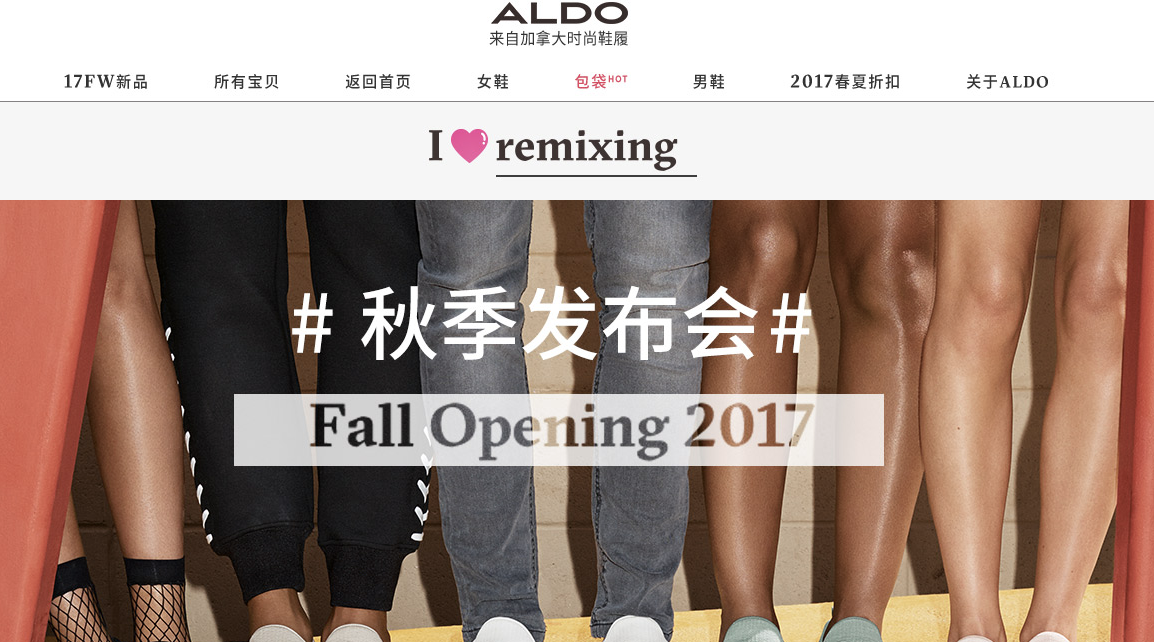
The triangular company pin sits on a ledge in Norman Jaskolka’s home. As he affixes it to his lapel every morning, the President of Aldo Group International reminds himself of what each point of the triangle represents.
“Love, integrity, respect,” says Jaskolka. “It’s really core to everything we do.”
Jaskolka joined Aldo, a leading Canadian footwear and accessories company, 22 years ago and started its international business in 2000. On his watch, Aldo has grown steadily outside of North America. It now has over 2,300 points of sales internationally and operates in 100 countries, including China. And on Aug. 15, 2015, the shoe company added a digital footprint in China, opening a Tmall store.
Video: Aldo Goes for Hearts & Soles of China Middle Class
As with entry into any new market or platform, Aldo had to strike a balance between providing what the consumers want and staying true to the Brand DNA. Started by Canadian immigrant Aldo Bensadoun in 1972, Aldo is celebrating its 45th anniversary this year and has a company culture and values that it’s proud to have kept intact for nearly a half-century.
They include the importance of being a “citizen of the world,” like their founder, being sensitive to styling in different cultures and having an appreciation for what’s needed to succeed in countries outside your home market.
“That’s the challenge we have every day, and we’d be arrogant and complacent to say we solved it,” said Jaskolka. “You have to be sure the consumer understands who we are and what we stand for.”
Building brand recognition in China, where there’s a lot of noise and customer expectation was a challenge for Aldo.
“We’re a very minimalist type of brand in terms of the way we shape the visual shopping experience. Our brick-and-mortar stores and digital platforms all have a common concept, which is modern, clean but playful,” Jaskolka said.
Advisors showed the company the “very visually dense” Chinese ads, and it took some time for Aldo to adapt to that consumer expectation, Jaskolka said.
Vyara Ndejuru, Aldo’s international director of marketing said it can be challenging to stand out to Chinese consumers. She said they have high product and brand-authenticity expectations, because their market has such deep and broad footwear offerings, ranging from luxury brands to grey-market goods. Online customers, therefore, heavily engage with content, looking for the right cues to make their buying decisions.
“Whereas with North American or Western customers, they go a few scrolls down, Chinese consumers expect to see a lot of different angles, like how to wear it. They have such a sense of what to do with the product, we have to give the right cues so they can feel confident about and attest to brand authentication,” Ndejuru said.
Jaskolka said the path to online in China wouldn’t have been the same without Tmall’s assistance. Its tools and marketing-promotion opportunities and reputation as a portal through which Chinese consumers discover brands factored heavily into Aldo’s decision to move online through Tmall.
“You have to meet the consumer in their journey, wherever they shop,” said Jaskolka. “When you look at the number of Chinese consumers shopping at Tmall, there’s no comparison that can be drawn with your own direct website. You have to accept the platform as part of you brand ecosystem in order to build brand awareness.”
And he adds “To the extent that the retailers that sell on Tmall can work alongside Tmall to understand consumer behavior‚ that’s where you ultimately get the most bang for your buck,” said Jaskolka.
Aldo has so far tried to strike a balance in China – using more product photography, adapting its messaging and content to at once reflect its brand ethos and engage with its consumer colorful ads. The brand positioning, which was validated by an eight-country global segmentation survey conducted a few years back, targets middle-class customers concerned with fashion and quality, but not necessarily looking for a luxury brand.
“We’re a brand for people who reach a certain level of sophistication and don’t have to wear a luxury brand to make a statement. They chose what best reflects who they are and show their confidence in a certain kind of styling,” said Jaskolka.
Aldo is cautiously confident about its online future in China. It needs to get the content and prices right to get visitors to its Tmall storefront. But the brand message and values are equally important.
“The challenge, the reality for anyone wanting to use Alibaba and Tmall as a gateway is to convert. You can bring customers to your store, but then, why will they buy?” Jaskolka said. “This is where creating beautiful products isn’t enough. It’s fundamental to build experiences, surprise and delight customers, staying core with our brand promise: to be aspirational, elevating and always accessible.”




